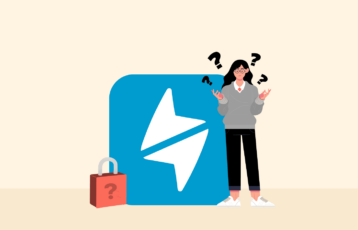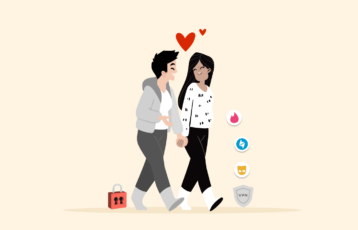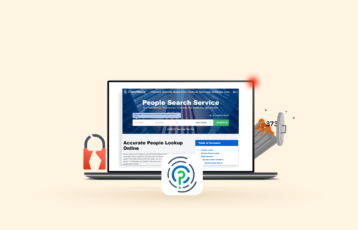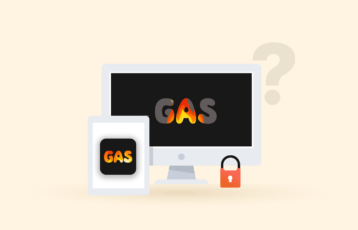Social media is a wonderful resource for staying connected with friends and family. In fact, people have become increasingly dependent on it for business purposes as well. So, it’s quite natural for everyone to worry about social media security. From phishing attempts to scams and identity theft, every dangerous activity can now be executed on these platforms.
We know you won’t be able to abandon social media use entirely. Platforms like Facebook, Instagram, WhatsApp, and Twitter are must-haves today. But you can certainly strive to protect these accounts from prying eyes, right?
This guide lists effective social media security tips and discusses best practices.
Why should you care about social media privacy?
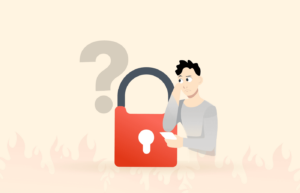
You might have heard a lot about social media security and privacy and have wondered why it matters at all. Haven’t you?
Indeed, harmless activities on Facebook, Instagram, Twitter, and all are fun to do. You would also like to know how people react to your posts and how they appreciate it when you share pictures of your birthday with family, old memories, and recent snaps.
You feel like a celebrity when people react to your posts, share it on their profiles, and follow you. The higher the number, the greater the honor. Isn’t it?
Now, wait here and think for a moment. Would you prefer the same people who engage on your posts and observe your activities to enter your house and meddle with your routine?
Would you allow them to take your old photo album with them?
Your answer will surely be a big NO because you consider these things a privacy breach.
Then how and why do you allow the same behavior on social media?
From your daily routine to the critical past and upcoming events of your life, your social media links know everything about you. In fact, they know it all more than those physically present around you.
And things do not remain confined to your immediate connections. Rather their friends of friends of friends and acquaintances also know all this stuff.
And this is how you expose your day and night schedule with all minute details to every stranger. You never know how many of these strangers are actually perpetrators.
They keep a note of all seemingly harmless useless details about you that you merely share online for fun. They then profile you and use your information for malicious purposes.
That’s where social media security awareness becomes essential. You must know how the social media apps operate and how your activities there could damage your life. The more you know, the more careful you’d remain.
If you still wonder how your social media accounts pose a risk to your security, take a look at this video:
Essential tips for enhanced social media security
We hope that you would have understood why you need to care about social media security by now.
Is it? Great!
Then you might now wonder how to tackle all the security and privacy issues in social media risking you!
Don’t panic. Below, we have listed the best tips for better social media privacy. You can easily follow them, learn them, and keep reminding yourself to stay safe.
These are not just some quick tips to protect your persona online, rather the best practices for enhanced security.
You can also share these tips with your friends and family to spread awareness.
1. Set up unique and secure passwords
The first essential piece in the puzzle of social media security tips is to set up unique passwords.
By unique, we mean the passwords should not have been used ever on any of your accounts. Nor should they have been used by anyone else.
While you can ensure the first condition, you certainly can’t be sure of the second requirement. Of course, how come you would know what passwords people use around the world.
But, in fact, you CAN know it.
The increasing number of data breaches, and the subsequent theft of login credentials, has led to the setup of breached databases. These sites upload breach data on their sites whilst frequently updating it. They allow you to check your password for uniqueness and a potential appearance in a breach.
So, if you simply visit such sites, you would learn how many people around the world share your passwords.
As a quick reference, we recommend you to visit HaveIBeenPwned.com and check your email address and password there.
If you find any of your details there, it’s a red alert that your data (at least the email address and the password) has already been accessed by threat actors.
However, you may not update your email address so easily. You can certainly update your passwords countless times.
Summing up, what you should do is to create a strong and unique password for every account. Then avoid reusing passwords on other accounts.
If you find this task dreary, you can use a password manager. The best password managers not only remember your passwords on your behalf, but they also let you create robust and unique passwords — and keep them safe for you.
This practice doesn’t only play a role in your account security on social networks. Rather you should apply it across all other online accounts as well.
2. Apply multi-factor authentication
Multi-factor authentication, in simple words, is the act of applying additional security to your accounts.
In situations where a perpetrator figures out your account password and tries to sign in on your behalf, MFA prevents such attempts.
This feature won’t let the perpetrator in unless the person proves to be yourself after authentication.
This could be anything from a one-time pin sent to your email address or mobile number, a security code, a secret question, or anything else.
Recall the one-time pins you receive on your email address and/or via SMS every time you sign in to your online banking account. It’s a classic example of multi-factor authentication (precisely, two-factor authentication).
Such security, however, isn’t necessary for financial institutions only. Rather it is also important for your social media accounts because these accounts include a lot more information about you than your bank.
Therefore, the next thing to ensure your social media security is to apply multi-factor authentication on your profiles.
Thankfully, common networks like Facebook and Twitter already support this feature. So, you simply need to review your account settings and turn 2FA on.
3. Check your account security settings
As cybersecurity incidents are becoming common, the tech giants behind different apps like Facebook keep updating their settings. They keep introducing new features that give you more control over your account security.
However, such updates may also modify your previous privacy settings.
Therefore, make it a habit to review your social media account privacy and security settings periodically.
4. Review your friend list/connections
Adding new people to your social networks is fun. You get to know about the nature and lifestyle of the people around the world.
But, adding too many of such strangers is undoubtedly a security risk.
Today, social media is flooded with perpetrators disguised as innocent persons. They often impersonate others to create such harmless profiles.
Often, the criminals also hack users’ legit profiles, which they then exploit to prey on others.
Therefore, you need to remain careful about who to add as you never know when a bad actor would connect with you. Also, keep an eye on your existing connections to find and remove any suspicious profiles immediately.
5. Keep checking your emails
It’s good to receive login alerts via email whenever somebody tries to sign in to your account without authorization.
However, the threat actors frequently mimic such alerts to prey on your social media accounts via phishing emails.
Be wary of such emails. Take a look at this guide on phishing emails to learn how this threat exists.
6. Think before you ‘post’
Although, it sounds harmless to post your pet’s picture and name on your Facebook profile.
But, did you just forget that you have the same detail saved a security question or the password to your online banking account?
Similarly, almost everything you post online may not look important to you. But, for a criminal hacker, they’re a treasure trove.
So, the next time you’re going to post something on your account, wait and think if it’s, in any way, related to your life. It’s better not to post anything than to post sensitive stuff and risk your social media security.
7. Beware of phishing messages
Just like emails, phishing attacks also execute via personal messages on your social profiles.
So, do not trust anything reaching your inbox from a stranger. Whereas, for friends too, avoid clicking on any links to games or websites, unless you’re sure about them.
8. Beware of scams
From tech support to prize money, scammers have flooded social media networks.
So, like phishing messages, you need to remain wary of such scams too. Don’t trust any ads or offers featuring tech support, giveaways, or prize money.
9. Remember to log out
Leaving your Facebook, Instagram, or other social media accounts logged in on your devices is a significant security risk. You never know when someone would access your device, either physically or remotely, and access your account.
For robust social media security, make sure to log out of all your accounts before leaving your computer or smartphone unattended.
10. Remember to use that ‘Block’ button
Is someone in your social network annoying you, doesn’t look legit, sending spam messages, or interfering with your privacy? The ‘Block’ option is all yours. Use it to get rid of such people right away.
11. Manage third-party app permissions
The different games and apps that integrate with Facebook, Twitter, and the likes, often aim at collecting your data. The infamous Cambridge Analytica scandal of 2014 is a classic example of how third=party apps steal your social media information.
To prevent such incidents from targeting you in the future, make sure to review the app permissions via your account settings periodically.
12. Use a VPN
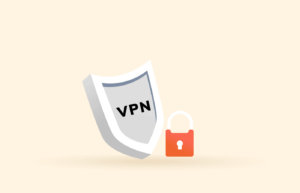
As always, a VPN is a savior when it comes to online security. So, how come we forget to mention this mate while talking about social media security!
A VPN protects your data from all prying eyes on your internet network. It shares your burden by safeguarding your accounts from all external social media security threats.
Thus, regardless of where you are, always keep a robust VPN installed and running on your device.
13. Stay vigilant
Last, but the most important among all social media security tips, is to remain vigilant.
Applying all the tips we shared above would certainly help you protect your accounts across social networks.
But, like all other technologies, social media is also vulnerable to cybersecurity issues.
Therefore, you should ensure a thorough periodic review of your accounts to retain your privacy in social media apps.
